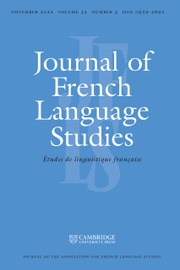-
- Get access
- Contains open access
Journal of French Language Studies Digital Archive is a repository of every single article published in the journal between 1991 and 1999. It houses over 2,500 pages of content, reproduced as high-resolution, searchable PDFs. The Archive marks the complete digitisation of Journal of French Language Studies, with all material available through Cambridge Core.
The archive contains approximately 370 articles from the journal's first 9 volumes.
For pricing information, contact us at:
online@cambridge.org in the Americas.
library.sales@cambridge.org for the Rest of the World.
- ISSN: 0959-2695 (Print), 1474-0079 (Online)
- Frequency: 3 issues per year
The Journal of French Language Studies is a bilingual journal that publishes significant work on French theoretical and applied linguistics including but not limited to synchronic and diachronic studies focusing on phonetics/phonology, morphology, syntax, lexis and semantics. Sociolinguistic, variation, corpus, first and second language acquisition, Natural Language Processing (NLP), Global South, digital humanities studies are all welcome as long as they are based on current theories and solid methodologies. In addition to standard French, we are also interested in all Gallo-Romance dialects (including varieties such as Picard, Franco-Provençal, etc.). Survey Articles reviewing the state of the art in a major field will also be considered as well as work in progress for the French Research Notes section and Book Reviews. Special Issues are published once a year and suggestions are welcome year-round.
La Revue d’Etudes de linguistique française est une revue bilingue qui publie des travaux importants sur la linguistique théorique et appliquée du français, y compris, mais sans s'y limiter, des études synchroniques et diachroniques axées sur la phonétique/phonologie, la morphologie, la syntaxe, le lexique et la sémantique. Les études sociolinguistiques, de variation, de corpus, d'acquisition d'une langue première et seconde, le traitement automatique du langage naturel (PNL), les études du Sud global, les humanités numériques sont toutes les bienvenues tant qu'elles sont basées sur des théories actuelles et des protocoles solides. Outre le français standard, nous nous intéressons également à tous les dialectes gallo-romans (y compris les variétés telles que le picard, le franco-provençal, etc.). Seront également pris en considération les articles faisant l'état de l'art dans un domaine majeur, ainsi que les travaux en cours pour la section French Research Notes et les Revues de livres. Les numéros spéciaux sont publiés une fois par an et les suggestions sont les bienvenues tout au long de l'année.



